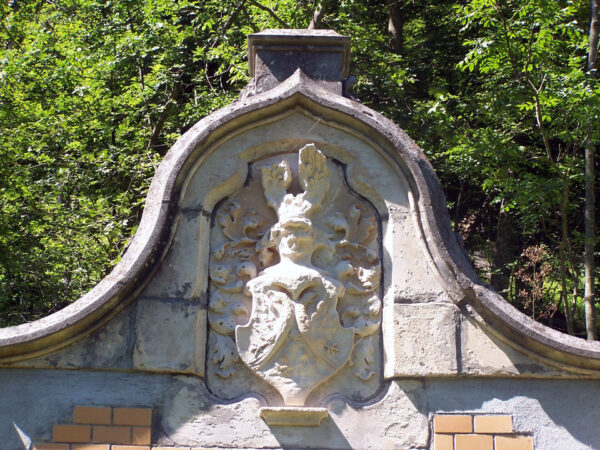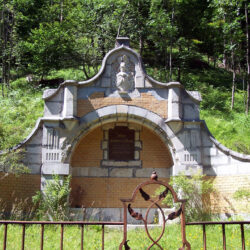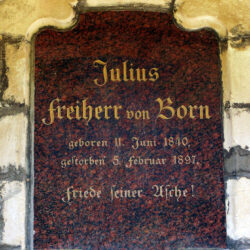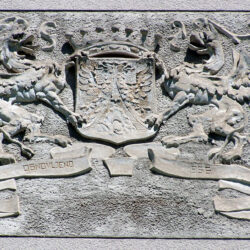
Coat of arms of the Born family in Jelendol
JELENDOL, PARK ABOVE JELENDOL (ST. KATHARINA, PUTERHOF) MANSION
Location of the coat of arms: tomb
On the edge of the forest, a stone’s throw from Puterhof Castle in Jelendol above Tržič, stands a small stone building that soon reveals itself to the visitor as a mausoleum. The inscription on the grave plaque and the carved coat of arms further show that since 1897 it has served as the final resting place of Julius Baron von Born.
Born was from Prussia rather than a native of Tržič. In 1880, he was elevated to the Austrian baronial rank on the basis of the Order of the Iron Crown, 2nd Class.He was born in 1840 in what is now the town of Babimost in modern Poland (the town, formerly part of the Prussian province of Posen—modern Poznań—used to be known by the German name Bomst). In Berlin, Born engaged in banking and entrepreneurship, specializing in rehabilitation of companies in difficulties. His work also led him to Carniola, where he helped rehabilitate the Carniolan Industrial Company (KID), from which he purchased a vast part of its estates in Tržič in 1891. His decision largely rested on opportunities for hunting and timber resources. As a guest of the director of Jesenice’s ironworks, Baron von Born had already made several visits to Tržič to take part in hunting parties and admire the local water and forest wealth. The sales contract, with a value of 236,000 florins, was concluded in Bled on September 15th, 1891.
Soon afterward, Born exchanged his estate in Pristava with a cattle rancher named Primoschitz for his estate in Puterhof, which was largely covered by forest. Between 1893 and 1895, he built a Tyrolean-style villa there and named it Puterhof. According to oral tradition, this was originally the name of a farm that previously stood in the same location. Born built trails leading to Puterhof and his forests, and in 1895 the road through the famous tunnel in the Dovžan Gorge (the memory of its construction is maintained by the memorial plaque mounted on the rock wall), which still connects Jelendol and Tržič.
Born lined the road with an electrical substation, numerous agricultural buildings, a sawmill, and houses for his gardener, estate administrator, sawmill workers, and hunters, and he also built a narrow-gauge railroad (3.4 miles) to transport timber into the valley. He fenced his hunting grounds in Jelendol and, passionate hunter that he was, colonized the area with a herd of ibex, which were ultimately destroyed by a scabies infestation.
Julius Baron von Born died in the early days of 1897 in a horseback-riding accident in Brighton. His remains were cremated in Hamburg and preserved in the “golden apple” in the family mausoleum above Puterhof Castle. For a long time, Julius was the only Born with his final resting place in the mausoleum until finally, in August 2008, the remains of his son Karl were also laid to rest there.
Sources:
Komić Marn, Renata: Prispevek k rekonstrukciji nekdanje podobe Bornovega gradu v Puterhofu (Jelendolu). Kronika 68, 2020, št. 3 (Iz zgodovine Tržiča), pp. 681–706.
Rugále, Mariano in Preinfalk, Miha: Blagoslovljeni in prekleti. 1. del: Plemiške rodbine 19. in 20. stoletja na Slovenskem. Ljubljana: Viharnik, 2010, pp. 29–36.



